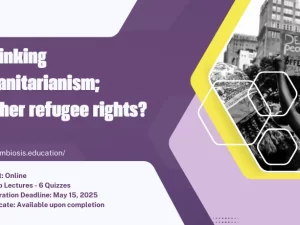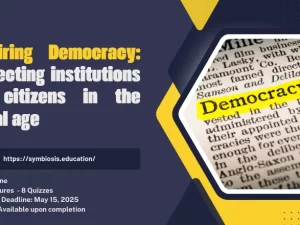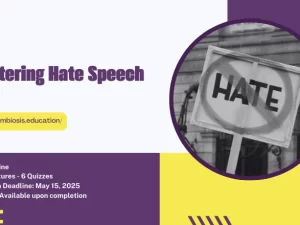Preventing Gender Based Violence and Raising Awareness on Gender Issues
- Description
- Curriculum

This course offers participants a comprehensive introduction to the issue of gender-based violence and the strategies necessary for its prevention. Through a focus on raising awareness about the root causes and widespread impact of this kind of violence, the programme encourages critical reflection on the societal norms and inequalities that sustain it. Participants will explore practical approaches to addressing these challenges, while gaining the knowledge and skills needed to actively support safer, more inclusive communities.
Key topics covered include gender equality, violence against women, violence prevention strategies, and the intersections of justice, inequality, and gender-based violence. Designed to empower participants to make informed, meaningful contributions to the fight against violence, the course equips learners to challenge harmful stereotypes and promote gender justice in their everyday lives and within their communities. By the end of the programme, participants will be better prepared to engage in advocacy, prevention initiatives, and community-based responses that foster equality and respect for all.
-
1Gender Equality - Cécile Gréboval
This course provides an in-depth exploration of gender equality, focusing on both the progress made and the challenges that remain. It highlights the gender equality standards set by the Council of Europe and examines the impact of the COVID-19 pandemic on women, particularly in terms of domestic violence, economic inequality, and restrictions on sexual and reproductive rights. Participants will also learn about the importance of addressing gender stereotypes and biases, particularly within the justice system, and the need for gender-sensitive policies to ensure women’s equal access to justice and decision-making. The course emphasizes the protection and integration of migrant, refugee, and asylum-seeking women and girls, and the crucial role of gender mainstreaming in achieving real gender equality across all sectors of society.
-
2Quiz
-
3Violence Against Women - Cécile Gréboval
This course covers the issue of violence against women and the measures in place to address it, with a focus on the Istanbul Convention. It explores the core elements of the Convention, including its focus on prevention, protection, prosecution, and coordinated policies. The course also examines key provisions such as the criminalization of various forms of violence, protections for migrant women and asylum seekers, and the involvement of relevant authorities in addressing violence. Additionally, it reviews the monitoring system used to assess the implementation of the Convention and discusses the ongoing challenges in ensuring effective support for victims.
-
4Quiz
-
5Violence Prevention - Heinrich Geldschläger
This course introduces violence prevention through the ecological model, offering a comprehensive framework for understanding the complex causes of gender-based violence. Participants will explore how traditional masculinity norms and difficulties in emotional regulation contribute to violent behavior, and will learn strategies for promoting non-violent communication, even in conflict situations. The course includes practical exercises and discussions, focusing on techniques to manage anger and prevent violent reactions. A key strategy presented is the "Time-out" method, designed to help individuals pause and avoid escalation, fostering more constructive conflict resolution.
-
6Quiz
-
7Justice, Inequality and Gender-based Violence - Marianne Hester
This course explores the Justice, Inequality and Gender-Based Violence project, developed in response to the rise in gender-based and domestic violence incidents during the COVID-19 pandemic. It examines how justice is understood, sought, and experienced by victims and survivors of gender-based violence — including sexual violence, domestic abuse, and harmful practices — as well as by practitioners in England and Wales. Participants will learn about the gap between formal justice systems and survivors’ lived experiences, and discover alternative forms of justice centered on accountability, recognition, empowerment, and community support.
-
8Quiz





